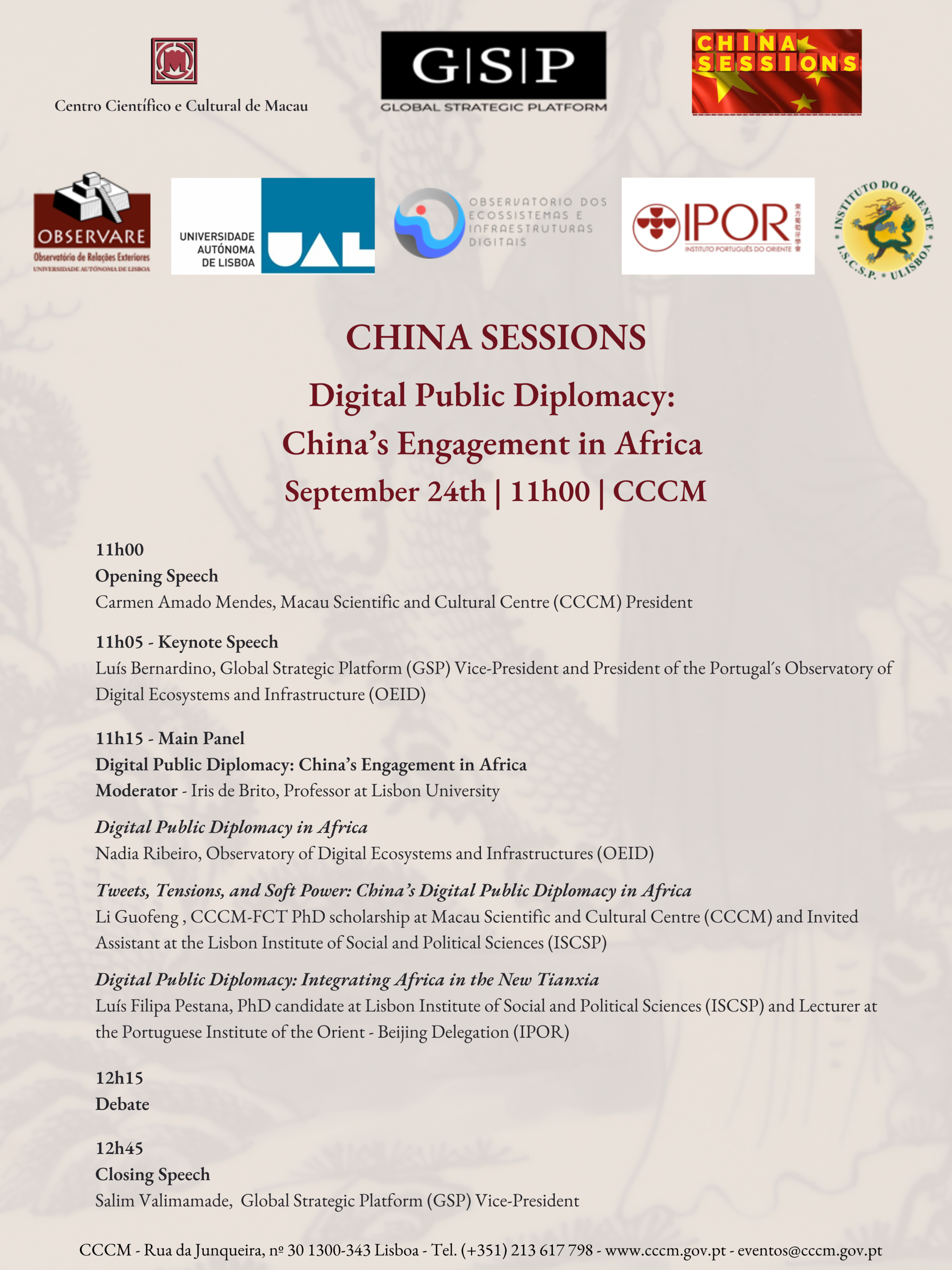
China Sessions – Digital Public Diplomacy: China’s Engagement in Africa
The next China Session, an event organized by the Global Strategic Platform and the Centro Científico e Cultural de Macau, focuses on the People’s Republic of China’s digital influence in Africa. Beijing’s ties with the continent date back to the 1950s and were mostly framed in ideological terms, as well as providing support for liberation movements to achieve their respective territories’ independence. Progressively, these relations evolved to become centered around development and trade. While ideological considerations were not entirely abandoned, China-Africa relations mutated into a more pragmatic approach as China itself developed and became more dependent on natural resources from overseas.
Aside from bilateral relations, Beijing promoted the Forum on China–Africa Cooperation (FOCAC), a multilateral framework that supports debt relief and loans for a wide variety of infrastructural projects and has, in recent years, branched into the field of technology, such as the usage of AI. The FOCAC has been viewed as a crucial part of the Belt and Road Initiative, a project that resulted in bigger investments in infrastructure around the globe.
Amidst high-level talks and agreements, public diplomacy is a key element to China’s global objectives, particularly in an age of social media. Through different platforms, the PRC attempts to generate a positive image of the country and attract more foreigners to experience China “as it is”. Furthermore, the new visa-free policies for tourists increased the exposure of the country with many foreign influencers having the chance to experience it.
China’s digital diplomacy aims, primarily, to portray the country as a well-intentioned and benign player of global politics, often as a counterpoint to the United States perceived interference in other countries’ domestic affairs. Members of the diplomatic corps often engage in exchanges with other users of platforms such as social media X, most of whom embody a more assertive and, at times, aggressive approach to criticism of China’s actions. The “Wolf Warrior” diplomats spearhead these efforts, but they are not alone in framing China as a responsible stakeholder of world affairs.
The Ministry of Education Centre for Language Education and Cooperation, responsible for the Confucius Institute, is present in more than 150 countries, where it actively promotes the Chinese language and culture, one of the nation’s main selling points. While initially centered in universities, it also has a presence in primary and secondary teaching. The Confucius Classroom is a project that envisions the promotion of Chinese language, exchange programs and the organization of cultural events. Additionally, the Confucius Institute is adapting to a borderless virtual reality by developing online courses that reach a wider audience.
In its engagement in Africa, digital tools have also played an important role in cementing China’s position in the continent. Despite Africa’s lower internet connection, mobile networks are playing a key role in keeping it linked to the rest of the world. The development of 5G networks, as exemplified by South Africa, has placed Chinese companies in a leading position in African connectivity infrastructure.
During the pandemic, China reached the African populations more effectively to promote its policies to contain the spread of Covid-19. Also, geopolitics and the economy are key to the messaging, alongside what the Chinese government labels “excellent Chinese culture”. Security issues have also gained traction, as China actively promotes the concept of “community of common destiny for mankind”.
This is further confirmed by the 2022 white paper “Jointly Build a Community with a Shared Future in Cyberspace”, a document in which China’s African cooperation is highlighted by the China-Africa Internet Development and Cooperation Forum and the China-Africa Partnership Plan on Digital Innovation. Traditional media, such as CGTN Africa and Xinhua, plays a special role in highlighting stories of people-to-people engagement in different parts of the continent.
Through these presentations, we intend to analyze the impact of China’s digital public diplomacy in Africa. Furthermore, it will allow for a better understanding of how Africa connects with China.
As Beijing attempts to create a “community with shared future in cyberspace”, what is Africa’s role in its establishment? What are the challenges and pitfalls that might arise? And how can Africa benefit from China’s greater expertise in the use of digital public diplomacy?
Zoom Link
https://videoconf-colibri.zoom.us/j/98948159283?pwd=fMPDYbWuqQXbobsOZxOHPd5yUU2blb.1
